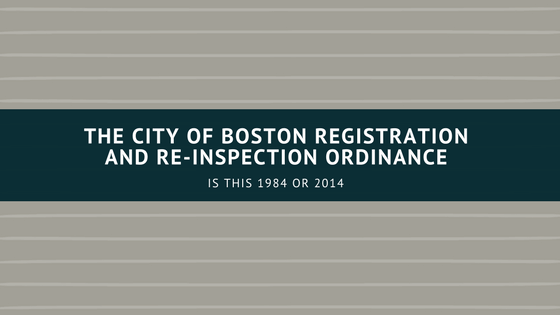Is This 1984 or 2014? In the novel “1984”, George Orwell predicts an era of total government control, with a loss of all personal liberties and a complete imposition of control by the state. The government, under the guise of protecting citizens, requires full registration of each individual, and allows the police to enter homes and businesses without cause or permission. Thirty years later, the Boston City Counsel enacted a Registration and Re-inspection Ordinance which, among other requirements, imposes an obligation on almost all rental property owners to register with the City and allows inspections of these dwellings, regardless of whether the resident requests same, and regardless of whether the property is in violation of any law. In addition, a new system of fees is imposed on property owners both when they complete and renew their registration and when they perform the mandated inspections. While the ordinance clearly raises red flags for proponents of civil liberties, failure to register and comply with this ordinance carries significant penalties.
As background, the City of Boston previously required all property owners to obtain an inspection whenever an apartment was relet. At a time when the unit was vacant, the property would be inspected and a certificate issued by the Inspectional Services Department (ISD). In addition, a resident had the ability to call ISD for an inspection anytime they believed a repair was needed. Thus, ISD inspectors were able to focus on apartments with purported code violations rather than expend resources on properties which were in compliance. If a property was maintained in good condition, such that a resident did not believe an inspection was necessary, ISD was not required to expend any resources performing inspections.
The new Ordinance now creates both a new system of registration for all rental properties, as well as a new system for mandated inspections of all rental housing, regardless of its condition. The initial requirement of the Ordinance is that all rental housing must be registered with ISD on or before August 31, 2013. Thereafter, the owner must re-register the property no later than July 1 of each year. If a property is sold, the new owner must re-register the property within thirty (30) days. While the Ordinance encourages ISD to provide for online registration, there is no requirement to provide for paperless registration. The certifications and information which must be provided is contained in the form provided by ISD. There is a $25 per unit fee for the initial registration, as well as a $15 fee to be paid at the time of annual renewal. Any rental unit which is not occupied by the owner is considered a rental unit which must be registered (including condominium units which are not owner-occupied). The certifications and information which must be provided is contained in the form provided by ISD. There is a $25 per unit fee for the initial registration, as well as a $15 fee to be paid at the time of annual renewal. Any rental unit which is not occupied by the owner is considered a rental unit which must be registered (including condominium units which are not owner-occupied). In addition, the owner of the property is required to post and maintain a sign, not less than 20 square inches in size, in the foyer or other visible location of the property, which provides the owner’s name, address and telephone number. If the owner is a corporation, the sign must include the President’s name, address, and telephone number. If the owner employs a managing agent, the manager’s information must also be provided. Likewise, if the owner resides outside of Massachusetts, a Boston based agent must be retained and identified.
The second mandate of this Ordinance requires almost all rental properties to be inspected once every five years. As an initial matter, it should be noted that the requirement does not apply to properties owned by the City or State and buildings with six or fewer units, so long as one unit is owner occupied. Other than that, this Ordinance applies regardless of whether this is new construction or an aging property, whether the property has countless code violation reports or has none, and regardless of whether the building is a “class A” property or a slum. The City will create a system by which an owner is notified of when their units will be inspected. Within thirty (30) days of such notice, the owner must either request ISD to perform such inspection or notify ISD of their intention to utilize an “alternative” method. If the property is already inspected by BHA, MBHP, REAC, or some other governmental inspection program, such inspection may be submitted. Likewise, a private inspector can be used, as long as the inspector meets certain qualifications and is approved by ISD. Otherwise, ISD will perform the inspection. Any failed inspection by the private inspector requires the owner to submit a compliance plan to confirm with ISD the manner in which the violations will be resolved. A fee of $50 is due for any inspection by ISD of a unit in a one-to-three unit building, and $75 for all other units. A filing fee of $15 per unit, capped at $2,500 per building and $5,000 per complex, is imposed for all non-ISD inspections. There is also an option to provide an “Alternative Compliance Plan” to avoid such inspections. Owners desiring to take advantage of this option must pay a fee of $50 for the first unit, and $10 for each additional unit, up to a maximum of $3,000 per building or $6,000 per complex. ISD will then consider such a request based on such factors as the properties history of code violations, a site visit, and compliance with this Ordinance. Presumably, properties which have a history of being compliant with the state sanitary code and have been responsive to ISD will be eligible for this exemption. Prior to performing any inspection, the resident must be given reasonable notice of the inspection. If a resident refuses access, the owner may notify ISD and, so long as ISD confirms the denial, the unit will be exempted from the inspection for that inspection period. Also, it should be noted that ISD will continue to inspect units upon receipt of a complaint from a resident.
Finally, the Ordinance creates a “Chronic Offender Point System” by which certain additional requirements will be imposed. Points are assessed to owners for various reasons, including being included on the city’s “Problem Property” list, failure to correct code violations within the mandated period, failure to correct emergency violations as required, and violations of this Ordinance. Once an owner accumulates a specific number of points, the subject property must be inspected once every three years and such inspection must be performed by ISD. Likewise, properties on the Problem Property List must be inspected each year and must submit an annual management plan that demonstrates a plan to address the violations in a manner acceptable to ISD. Likewise, a $300 fine is imposed for each additional point which is assessed.
In summary:
- Register your rental property in the City of Boston by August 31, 2013 and annually thereafter (and pay your fees);
- Post the required owner and agent information on the property immediately;
- Insure that your property is inspected by ISD or your own inspector when ISD notifies you and at least every five (5) years (and pay your fees);
- If possible, seek an alternative compliance plan from ISD (and pay your fees);
- Insure that you respond to all ISD notices and resolve all violations in a timely manner;
- Failure to comply with these requirement will result (yes, you guessed it) in a monthly fine.
Of course, this article is intended to provide basic guidance on the Ordinance. For an in depth analysis on the implications of the Ordinance on an individual owner or property, feel free to contact this office or your legal counsel.

